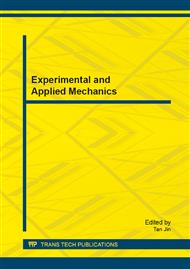p.215
p.220
p.225
p.231
p.236
p.244
p.248
p.252
p.258
A Research on Strength Criteria Based on Material Structure
Abstract:
Strength criteria for materials in the classical elastoplastic theory are formed mostly based on experiments and some assumptions [1, . However, no concensus has been achieved though many strength models were put forward to explore the applicable material strength criteria previously. Even the influence of material structures on strength has not been realized. In this article, the tensile failure strength criterion, shear strength criterion and strength criterion of friction materials are explored on the basis of the model of material with a structure of uniformly random distribution. Through analysis, it can be discovered that the strength criteria in the classical elastoplastic theory can be derived from the complex material theory based on the concept of material structure. However, as the theoretical basis, conditions of derivation and assumptions of concepts are totally different, it is proved that the complex material theory used for studying the material structures can fully cover the contents and conclusions obtained in classical elastoplastic theory.
Info:
Periodical:
Pages:
236-243
DOI:
Citation:
Online since:
February 2014
Authors:
Price:
Сopyright:
© 2014 Trans Tech Publications Ltd. All Rights Reserved
Share:
Citation:


